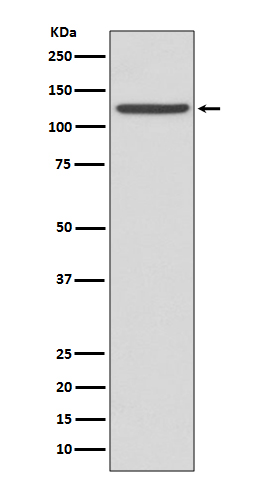
| WB | 1/500-1/1000 | Human,Mouse,Rat |
| IF | 咨询技术 | Human,Mouse,Rat |
| IHC | 1/50-1/100 | Human,Mouse,Rat |
| ICC | 技术咨询 | Human,Mouse,Rat |
| FCM | 咨询技术 | Human,Mouse,Rat |
| Elisa | 咨询技术 | Human,Mouse,Rat |
| Aliases | ITGA2B; GP2B; ITGAB; Integrin alpha-IIb; GPalpha IIb; GPIIb; Platelet membrane glycoprotein IIb; CD41 |
| Entrez GeneID | 3674 |
| WB Predicted band size | Calculated MW: 113 kDa; Observed MW: 135 kDa |
| Host/Isotype | Rabbit IgG |
| Antibody Type | Primary antibody |
| Storage | Store at 4°C short term. Aliquot and store at -20°C long term. Avoid freeze/thaw cycles. |
| Species Reactivity | Human |
| Immunogen | A synthesized peptide derived from human CD41 |
| Formulation | Purified antibody in PBS with 0.05% sodium azide. |
+ +
以下是3篇关于Integrin alpha IIb抗体的参考文献摘要概括:
1. **文献名称**: *"A monoclonal antibody against the platelet fibrinogen receptor contains a subunit-specific ligand-binding site"*
**作者**: Phillips DR, Charo IF, Scarborough RM
**摘要**: 该研究报道了一种针对Integrin αIIbβ3的单克隆抗体(如7E3),可特异性阻断纤维蛋白原结合位点,揭示了其在抑制血小板聚集中的机制,为抗血栓治疗提供理论依据。
2. **文献名称**: *"Molecular identification of a novel fibrinogen receptor on human platelets"*
**作者**: Coller BS, Peerschke EI, Scudder LE
**摘要**: 通过单克隆抗体(如10E5)研究发现Integrin αIIbβ3是血小板表面主要的纤维蛋白原受体,证实其在血栓形成中的作用,并推动靶向抗体在ITP(免疫性血小板减少症)诊断中的应用。
3. **文献名称**: *"Anti-integrin αIIb therapy: a novel approach for immune thrombocytopenia"*
**作者**: Nurden AT, Freson K, Seligsohn U
**摘要**: 综述了靶向Integrin αIIb的抗体(如Abciximab)在免疫性血小板减少症(ITP)中的治疗潜力,强调其通过阻断αIIbβ3复合物减少血小板破坏的临床效果。
4. **文献名称**: *"Flow cytometric analysis of platelet surface glycoproteins using CD41 and CD61 antibodies"*
**作者**: Jennings LK, Ashrafian H, Hougie C
**摘要**: 描述利用CD41(αIIb)特异性抗体通过流式细胞术检测血小板表面表达水平,为遗传性血小板功能障碍(如Glanzmann血栓无力症)提供快速诊断方法。
Integrin alpha IIb (αIIb), also known as CD41. is a critical subunit of the αIIbβ3 integrin heterodimer, a transmembrane receptor predominantly expressed on platelets and megakaryocytes. This integrin plays a central role in platelet aggregation and thrombus formation by mediating interactions with extracellular matrix proteins such as fibrinogen, von Willebrand factor, and fibronectin. Upon platelet activation, αIIbβ3 undergoes conformational changes, enabling ligand binding and outside-in signaling, which stabilizes platelet adhesion and clot retraction.
Antibodies targeting integrin alpha IIb are widely used in research and diagnostics to study platelet function, activation mechanisms, and disorders like Glanzmann thrombasthenia, a rare bleeding disorder caused by αIIb or β3 subunit mutations. These antibodies can block ligand binding, inhibit platelet aggregation, or serve as detection tools in flow cytometry, immunohistochemistry, or Western blotting to quantify αIIb expression. In clinical contexts, monoclonal antibodies (e.g., abciximab) targeting αIIbβ3 have been employed as antithrombotic agents to prevent arterial clotting in high-risk cardiovascular patients.
However, improper regulation of αIIbβ3 is linked to pathological thrombosis, making it a therapeutic target. Research using αIIb-specific antibodies continues to elucidate structural dynamics, signaling pathways, and potential interventions for bleeding or thrombotic diseases. Their specificity also aids in distinguishing platelet-derived cells in mixed populations, supporting advancements in hematology and vascular biology.
×